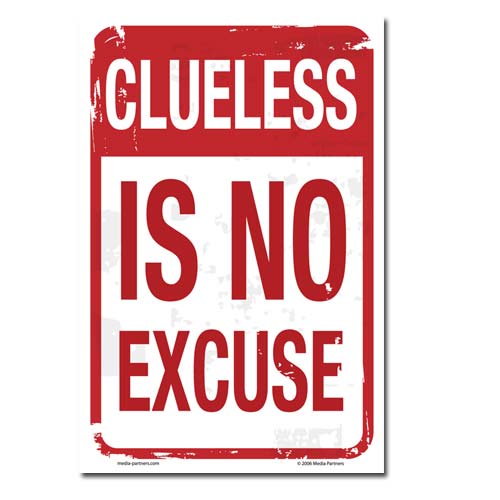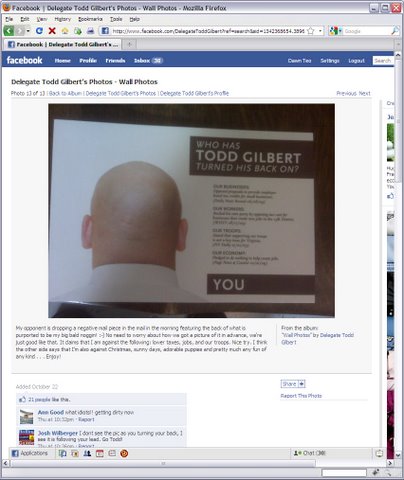Virginia legislator Todd Gilbert (R-Woodstock) not only stole campaign material from his opponent on Friday, he also had the hubris to brag about the achievement on his Facebook fan page.
“My opponent is dropping a negative mail piece in the mail in the morning…No need to worry about how we got a picture of it in advance” reads Gilbert’s fan page above a photograph of his opponent’s mailer. The picture was posted before the mailer was delivered to a single home.
While the idea of a candidate bragging on his Facebook page about his unethical escapades is a little funny at first (ok, it’s hilarious), there may be more serious implications. Specifically, Virginia Democrats are worried that critical microtargeting data may have been compromised, both for Gilbert’s opponent, John Lesinski and for other Democratic candidates in Virginia.

The mailers were at a mail house for about 24 hours while being addressed. Then, just a few short hours before Gilbert posted the mailer on Facebook, they were delivered to the post office. According a source within the Lesinski campaign, based on the timeline and circumstances, there were only two possibilities for how Gilbert got the mailer. The most likely scenario is that an employee of the mail house gave a copy to Gilbert or one of his associates. Another scenario is that a postal employee snatched the mailer from the sorting center just after it arrived. Neither scenario (mail theft or political espionage) is good for Gilbert.

According to sources within the Lesinski campaign, Lesinski plans to send an open letter to Gilbert Monday morning demanding that Gilbert apologize for the incident and disclose the source of the leak and the circumstances under which he received the document and internal campaign information. If Gilbert does not provide answers immediately, Lesinski intends to take legal action.
Mail house employees who have access to mailers often also have access to the microtargeting lists being used to address them, which presents a chief concern for local Democrats who are asking whether the mail house in question is a leaky ship. If so, then the Democrats’ microtargeting list may also have been compromised, and not just for the Lesinski campaign. The same mail house handles mailers (and thus targeted lists) for other Democratic campaigns in Virginia.
Professor Matt Hindman, who teaches information technology and politics at Arizona State University, sums it up, “In the modern day and age, the microtarging list is probably the most sensitive campaign document. If they cross reference with their own list, they’ll know a lot about who the campaign is contacting. This list is a powerful window into campaign strategy.”
A microtargeting list can be reverse-engineered through advanced computational methods to create a comprehensive analysis of a campaign’s most critical internal strategies. During the last two weeks of a race, when campaigns shift from persuasion efforts to get-out-the-vote efforts, the effects of compromised data could be particularly devastating.
At this juncture, campaigns have spent months or years and thousands to hundreds of thousands of dollars persuading voters, and they focus solely on getting the voters who are most likely to vote for their candidate to the polls. If an unscrupulous candidate has an opponent’s final GOTV list, he or she will likely work to suppress voter turnout for everyone on the targeted list. The GOP has been accused of voter suppression numerous times in the past. Most notably, New Hampshire Republicans hired a telemarketing firm to jam the phone lines of a Democratic phone bank on Election Day in a 2002 Senate race.
“If this list is compromised, it’s the equivalent of stealing your opponent’s playbook the day before the game,” says Hindman. So far, we’ve been unable to confirm which mail house Lesinski used (Lesinski’s campaign isn’t saying) or which other Virginia candidates use the same mail house.
On the other hand, there is a possibility that Gilbert obtained the mailer as sort of a rival’s prank, but with this hanging over the head of that mail house, candidates will be wary about using that firm. If so, Gilbert’s little prank could cost people their jobs. If he obtained the mailer from someone working in the U.S. Postal Service sorting center, that person could, at the very least, lose their job or even end up charged with mail theft, a serious federal crime.
Whether this case turns out to be a prank or statewide political espionage, one thing is for sure: as the Assistant Commonwealth Attorney (prosecutor), Gilbert should have known better. Those who commented on Gilbert’s Facebook post also should have known better, especially the legislator (Virginia Delegate Matt Lohr, R-26) and Washington DC reporter (Jennifer Ann Wishon, Christian Broadcasting Network News) who posted supportive comments. In all, about 30 people posted comments, none of which were critical or questioning of the ethical violation. Ironically one user posted, “…I learned yesterday even bad publicity can be good…”


UPDATE: Attempts to reach Gilbert for comment have been unsuccessful. Gilbert’s legislative aide, Gary Frink, says he is unauthorized to divulge the source of the illicit materials and information. We are waiting for Gilbert to return our calls.
Cross-posted at: http://www.huffingtonpost.com/…
9 comments